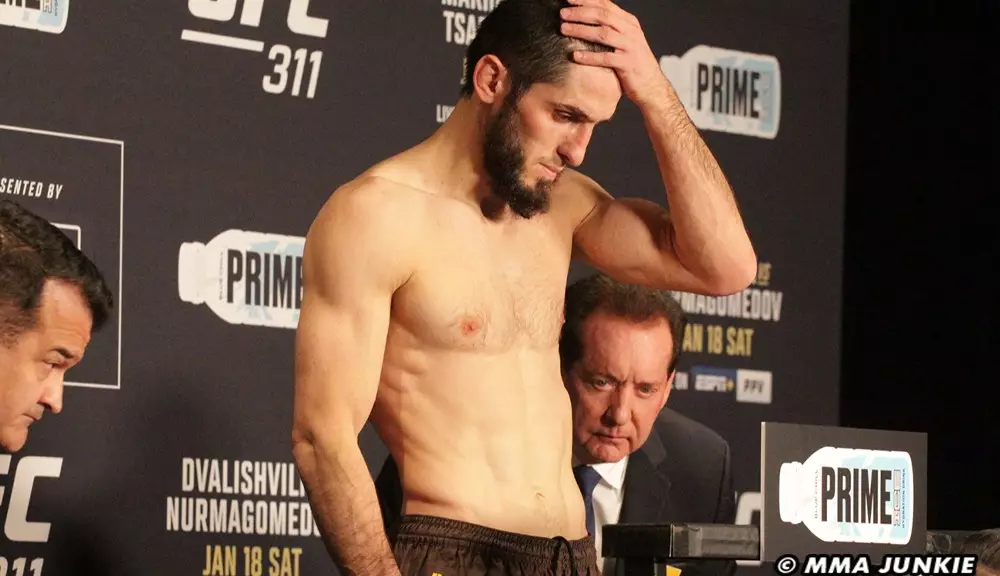Islam Makhachev stands at a pivotal moment in his career following his recent triumph at UFC 311. With a record of 27 wins and just one loss, he has firmly established himself as a dominant force in the lightweight division. However, the question looms large: should Makhachev pursue titles in other weight classes, or should he focus on cementing his legacy in the lightweight division? Analyst Alan Jouban weighs in on this debate, expressing skepticism about Makhachev’s intention to leap into higher weight divisions and suggesting that doing so could potentially undermine his accomplishments.
Makhachev recently set a record for consecutive lightweight title defenses after submitting Renato Moicano in the first round at UFC 311, displaying not only exceptional skill but also the kind of dominance that is required to be considered one of the greats in mixed martial arts. His accomplishments have set the stage for conversations about legacy and what it truly means to be a champion. While some fighters shift between weight classes in search of additional gold, Jouban argues that Makhachev’s current reign deserves to be focused on primarily.
Jouban’s perspective emphasizes that being a successful and dominant champion in a single weight class is in itself a significant achievement. As he expressed, “I like to see guys at their weight do dominant things and set records.” In this light, Makhachev’s climb through the lightweight ranks should be rewarded with dedicated defenses rather than distraction by inter-divisional pursuits. Jouban’s call for clarity in Makhachev’s focus offers a critical reminder of the importance of establishing oneself as a lasting figure in a specific category.
The narrative of athletes seeking multiple divisional titles has become somewhat prevalent in the realm of mixed martial arts. Upon examining the trend, it becomes evident that while some champions have successfully navigated this path – like Daniel Cormier and Amanda Nunes – others have struggled to maintain their foothold after stepping outside their weight classes. This brings to light the inherent risks associated with moving up and down the weight spectrum.
Makhachev’s hesitation to challenge the current welterweight champion, Belal Muhammad, further complicates matters. Although he has offered to step into the middleweight arena against reigning champion Dricus Du Plessis if given an opportunity, the question remains: is this pursuit necessary? Jouban suggests that Makhachev has everything to protect as the reigning lightweight champ; therefore, the stakes of engaging with a higher division may not align with his current ambitions or the integrity of the lightweight category he represents.
Despite Makhachev’s substantial achievements, including his recent record-setting defenses, there are still a host of contenders waiting for their shot at the title. Most notably, Arman Tsarukyan’s near-challenger status has been highlighted by Jouban, who believes Tsarukyan is the one opponent that could challenge Makhachev on a comparable level, especially regarding grappling prowess. The prospect of allowing Tsarukyan another opportunity to vie for the belt adds another layer to the narrative—how can the champion justify moving up in weight when his division’s contenders remain relevant?
Jouban’s comments underscore the potential risks associated with abandoning the lightweight division too soon. Heading into another weight class when there are evident challengers may not reflect the strategic choices that a champion should consider. Rather than developing an image of a fighter willing to leap above his competition without settling his own backyard, Makhachev might benefit from solidifying his place within the 155-pound bracket. This goes beyond mere rankings; it has implications for fans and fighters alike who seek a champion grounded in their respective weight class.
Islam Makhachev’s journey is still unfolding, and as a fighter who has already proved his mettle, the road ahead is pivotal. Whether he chooses to defend his lightweight title or pursue aspirations in other divisions will shape his legacy in the annals of UFC history. As Jouban astutely points out, there is great value in remaining a dominant presence in one’s division. The world of mixed martial arts has witnessed legends born from resilience and singular focus—qualities that resonate with fans and future champions alike.
While the allure of becoming a multi-divisional champion can be enticing, the principles of legacy and dominance in Iran’s respective weight class might be the more prudent path for Makhachev. His continuing saga as a lightweight champion could, in time, yield a legacy that resonates more profoundly than a passing title in a higher division. Thus, the ultimate question remains: will Makhachev allow his prowess to shine brightly in one division before seeking greater heights? Only time will tell.

